We provide critical science for management of the Great Barrier Reef
The Coral Reef Algae Lab focuses on understanding the positive and negative roles of tropical macroalgae in the functioning of coral reefs. We are driven by broader physiological, ecological, biogeochemical and conservation questions related to tropical macroalgae and coral reef ecosystems. We aim to understand the causes and consequences of macroalgal abundance in reefs, and how human activities affect algae and their interactions with corals.
Our lab provides fundamental knowledge on coralline algae, a group of calcareous red algae critical for reef building, coral resilience and reef restoration. Our studies focus on species discovery, calcification, mineralogy and eco-physiology of coralline algae. We work on unique collections and datasets of coralline algae from the Great Barrier Reef that are currently informing critical management strategies and provide key knowledge for the conservation of reef ecosystems.
Primary researchers
Associate Professor Guillermo Diaz Pulido
Lead
Phycology, coral reef ecology, coral-algal interactions
Soren (Schipper) Huber
PhD student
Coralline algae, coral reef restoration
Postdoctoral Research Fellow
Algal taxonomy, molecular systematics, coralline algae
Tim Jackson
Honours student
DNA barcoding, algae
Jenny Fong
Postdoctoral Research Fellow
Phycology, physiology, coral reef ecology
Our expertise
- Ecological studies in coral reefs
- Manipulative field experiments
- Physiology (photosynthesis, calcification) of macroalgae
- Ocean acidification (pCO2/pH) effects on macroalgae
- Species discovery and identification of tropical macroalgae
- Roles of algae in coral reefs
- Macroalgal blooms and their drivers in coral reefs.
- Coralline algae calcification and mineralogy
- Coral-algal competition and dynamics
- Coral bleaching
- Impacts of water quality decline (nutrient pollution/eutrophication, sedimentation) on reefs
- Anthropogenic impacts on coral reefs.
Impacts of ocean acidification and warming on benthic algae
Ocean acidification due to increased carbon dioxide emissions from human activities has profound impacts on marine systems, particularly coral reefs.
Our group studies the effect of ocean acidification on fleshy macroalgae and coralline algae in the Great Barrier Reef.
We have found that these two groups of macroalgae respond very differently to CO2 enrichment, with some fleshy macroalgae potentially benefiting from ocean acidification. Coralline algae have limestone skeletons that are very soluble in low seawater pH, making this group of macroalgae quite sensitive to ocean acidification. This sensitivity however, varies considerable among coralline algal species.
Our lab continues to address the issue of ocean acidification effects on macroalgae and reefs, aiming to understand the biological, physiological and molecular mechanisms underpinning responses, and the potential of macroalgae to adapt to rapid climate change.
Funding sources
This research has been funded by ARC, and the Great Barrier Reef Foundation.
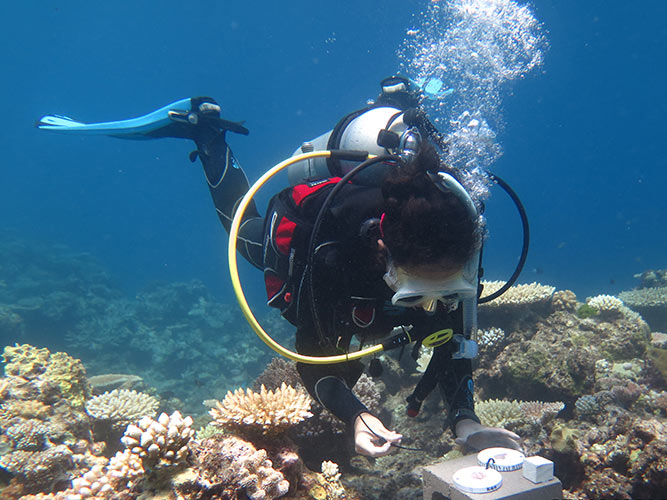
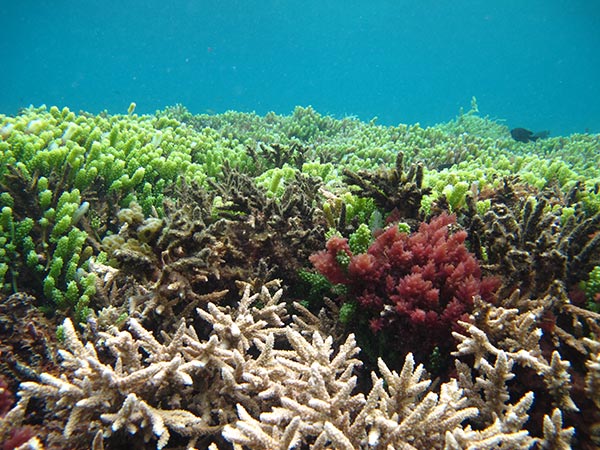
Community ecology and dynamics of marine algae
The distribution and abundance of macroalgae in the Great Barrier Reef varies considerably across the continental shelf, with fleshy macroalgae being more abundant in nearshore reefs compared to outer reefs, while coralline red algae are more abundant in the outer reefs. Macroalgae are also highly seasonal with some species proliferating during the winter months while others growth more actively during summer.&
Our group investigates the spatial and temporal variability in macroalgae, the causes of these distributions, and the consequences for reef conservation. Understanding the ecological dynamics of macroalgae is critical for addressing the causes and consequences of macroalgal blooms in coral reefs.
Coralline algae taxonomy and diversity
Crustose coralline algae (CCA) are calcifying red algae that contribute to reef resilience by providing cues that enhance coral larval settlement. Coral reef growth and construction depends to a large extent on the ability of coralline algae to calcify and glue (or cement) the reef framework.
Despite their importance to the Great Barrier Reef, CCA species diversity is poorly known. To fill this knowledge gap, our lab conducts taxonomic, systematic and biodiversity studies on crustose coralline algae. Our findings have revealed this is a highly diverse group, including many undescribed species. Our current work is focused on describing several new species of algae to science.
Funding sources
This research is funded by the Australian Biological Resource Study.
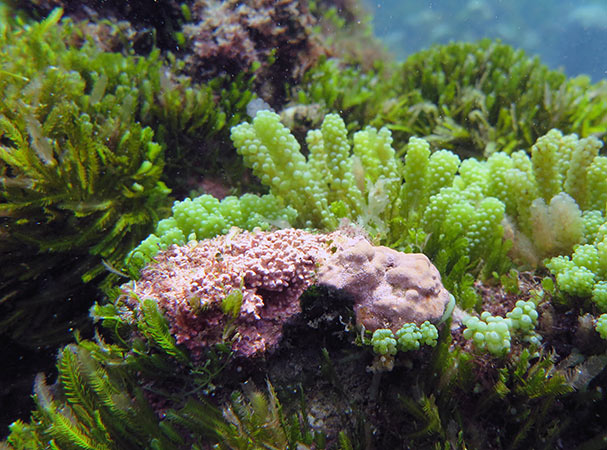
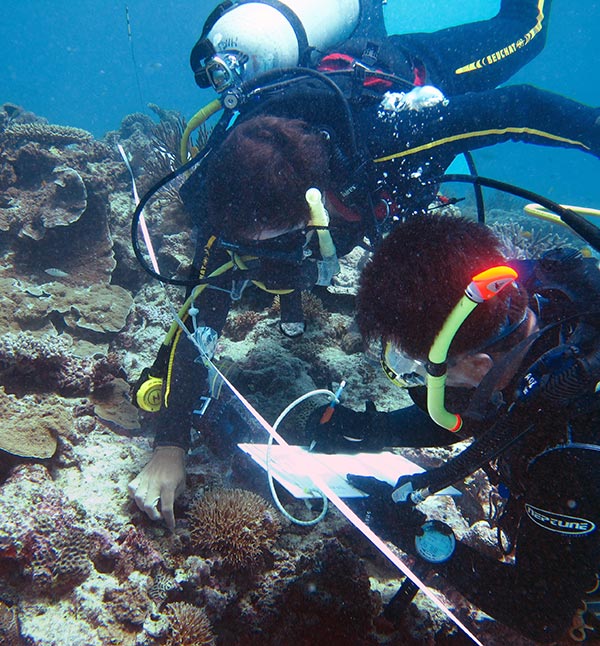
Coral reef restoration
The Great Barrier Reef contributes $6 billion to the Australian economy—via tourism and other industries—yet reefs are in serious decline and modelling predictions suggest many will be lost in the near future.
Our Lab is actively involved with the Australian Institute of Marine Science (AIMS) Reef Restoration and Adaptation Program (RRAP), a consortium of institutions and experts passionate about developing and implementing techniques to restore reef ecosystems. One of these techniques focuses on optimising the settlement and recruitment of coral larvae onto artificial substrates in the lab. It is well known that many larvae prefer to settle on or adjacent to crustose coralline algae (CCA).
Lead researcher Associate Professor Diaz-Pulido from the RRAP Coral Aquaculture and Deployment R&D Subprogram is generating critical information on CCA-larval interactions that can be used to optimise the settlement and recruitment of core coral species. The team is also looking at testing strategies to control macroalgal fouling to minimise competition with the young corals. The impact of this research will be evidenced in the development of methodologies that will enhance the recovery of coral populations.
Funding sources
Project currently funded by the Australian Institute of Marine Science.
Coral-algal interactions
Competition between corals and macroalgae is intense in coral reefs. Understanding the mechanisms by which corals and algae interact and the drivers mediating these interactions is therefore critical to reef management. Our research has contributed with the understanding of space competition and has demonstrated the sensitivity of some reef-building corals to macroalgal overgrowth under ocean acidification. We are also focused on documenting the positive interactions between coralline algae and coral larval settlement.
Funding sources
This research has been funded by ARC.
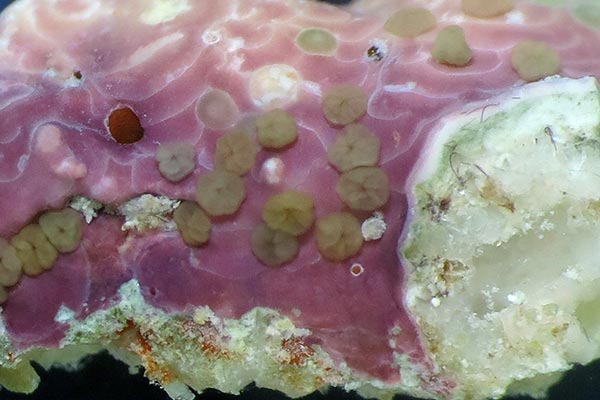
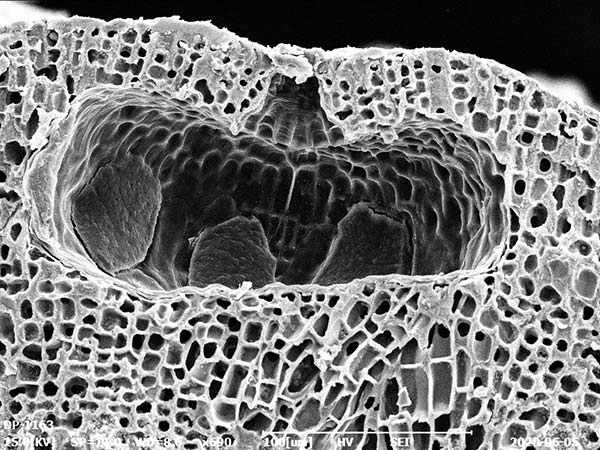
Coralline algae calcification
Coralline algae skeletons are composed of a form of calcium carbonate (high magnesium calcite) that is much more soluble than the aragonite skeleton of reef-building corals. There is concern, therefore, that coralline algae will dissolve more rapidly than those of corals under ocean acidification conditions.
A better understanding of the process of mineralisation and calcification (or biomineralisation) in coralline algae will help us predict the responses of coralline algae to a changing climate and determine whether coralline algae will continue to calcify and contribute to reef cementation and reef building processes in the future.
Funding sources
This research has been funded by the Great Barrier Reef Foundation and ARC.
Partnerships
Our lab collaborates with AIMS to develop techniques to enhance the settlement of coral larvae and contribute to the restoration of key coral populations.
We work with carbonate chemists from ANU to understand mineralogical processes of coralline algae. The use of cutting-edge microscopes at ANU is fundamental to this purpose.
We conduct research in collaboration with overseas partners to understand the roles of algae in reefs and provide capacity building.
The GBRF has supported a variety of projects on reef resilience and the role of coralline algae in coral reefs.
Contact details
- Phone
- (07) 5552 7269
- Location and postal address
- Coastal and Marine Research Centre
- Room 2.01, Building G51
- Griffith University
- Gold Coast, Queensland, 4222